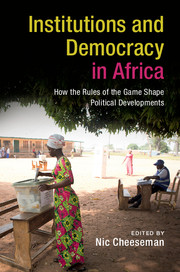Book contents
- Frontmatter
- Dedication
- Contents
- List of Figures
- List of Tables
- List of Contributors
- 1 Introduction: Understanding African Politics: Bringing the State Back In
- Part I Institutional Foundations
- Part II Law and Order
- Part III Elections, Parties and Political Competition
- Part IV Countervailing Institutions
- 12 The Legislature: Institutional Strengthening in Dominant-Party States
- 13 The Judiciary: Courts, Judges and the Rule of Law
- 14 Decentralisation: Accountability in Local Government
- 15 Conclusion: Political Institutions and Democracy in Africa: A Research Agenda
- Index
- References
15 - Conclusion: Political Institutions and Democracy in Africa: A Research Agenda
from Part IV - Countervailing Institutions
Published online by Cambridge University Press: 05 February 2018
- Frontmatter
- Dedication
- Contents
- List of Figures
- List of Tables
- List of Contributors
- 1 Introduction: Understanding African Politics: Bringing the State Back In
- Part I Institutional Foundations
- Part II Law and Order
- Part III Elections, Parties and Political Competition
- Part IV Countervailing Institutions
- 12 The Legislature: Institutional Strengthening in Dominant-Party States
- 13 The Judiciary: Courts, Judges and the Rule of Law
- 14 Decentralisation: Accountability in Local Government
- 15 Conclusion: Political Institutions and Democracy in Africa: A Research Agenda
- Index
- References
Summary
The thirteen chapters that make up this book have demonstrated the significance of formal political institutions for democracy and development in Africa. However, it is important not to exaggerate the extent to which African politics has changed. The reintroduction of multiparty politics did not represent a clean break from the authoritarian era any more than the first decade of independence represented a clean break from the colonial period. During both transitions much changed, but much also remained the same. The survival of old political logics – winner-takes-all politics, neo-patrimonialism and so on – meant that in many countries the official rules of the game continued to be compromised in important ways in the 1990s. As a result, significant variations have emerged in the degree of political institutionalisation on the continent, which makes it impossible to speak of a common ‘African experience’.
However, while countries with more dysfunctional institutional arrangements typically dominate the headlines, their experience should not blind us to the fact that there is strong evidence of institutional strengthening in a number of states – including some of those in which the barriers to democratisation initially appeared to be greatest. For example, term limits have become entrenched in Kenya and Nigeria, two bastions of Big Man politics, while both coup-prone Ghana and conflict-prone Sierra Leone have experienced peaceful transfers of power. These findings raise important questions: under what conditions are we most likely to see the strengthening of formal institutions in Africa? How much variation exists? What kind of theoretical framework can best capture this?
Many different kinds of institutional analysis have been pursued within comparative politics, which makes providing a comprehensive overview here impossible. However, it is worth sketching out how the literature has developed over the years, because doing so highlights how it can be used to illuminate the role of political institutions in Africa. The early analysis of institutions that occurred towards the end of the nineteenth century tended to focus on how organisations such as bureaucracies should be designed (Koelble 1995). Partly as a result, it typically concentrated on the normative role of such bodies and often overlooked issues such as the empirical impact of institutions, how individuals operate within organisational structures and how they evolve over time.
- Type
- Chapter
- Information
- Institutions and Democracy in AfricaHow the Rules of the Game Shape Political Developments, pp. 351 - 375Publisher: Cambridge University PressPrint publication year: 2018
References
- 2
- Cited by



